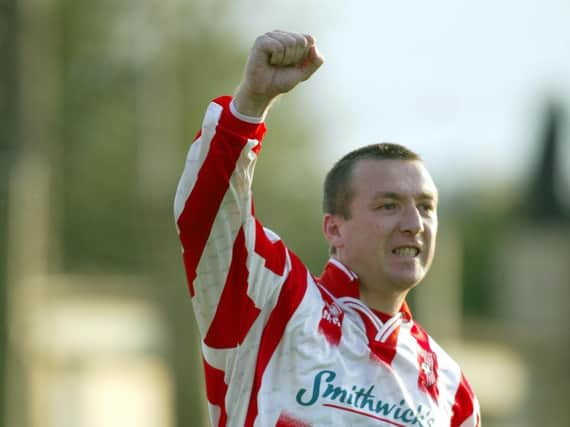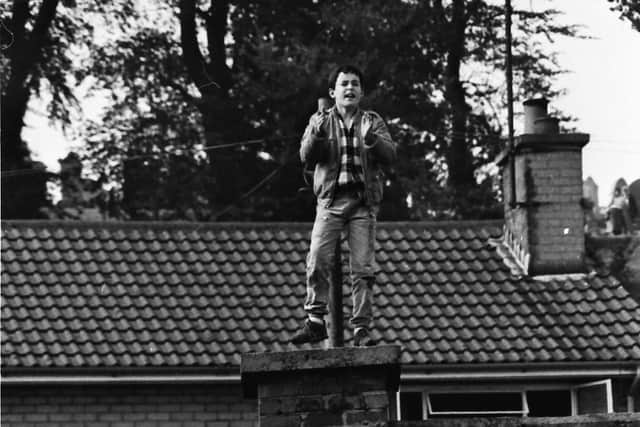Eddie Mahon calls for Derry City Hall of Fame


But, before I do, let me say just how much I enjoyed the recent Derry City ‘lockdown’ quiz though it must be said that I’m afraid I (we) didn’t cover ourselves with glory, finishing just in the lower half of the table.
And, to be fair, it wasn’t the knowledge that did for us but the ‘fastest finger first’ element. Example: while we know that the scorer of that goal in Paris was William Gallas, by the time our thought processes had kicked in the Thierry Henry button had already been pressed.
Advertisement
Hide AdAdvertisement
Hide AdBut I digress. The three hobby horses to which I refer above would, I believe, fill a gap in the club’s affairs and help to create a widespread interest.


While I’ve specified ‘three’ they are, in reality, just three sides of the same triangle. I’m talking about establishing a ‘Hall of Fame’ where we could honour the club’s heroes past – and not so past. None of whom, of course, would still be playing!
The list would have two sections; a posthumous one for the likes of Jimmy Kelly, Fay Coyle etc. while the other (obviously) would be for those who are still with us.
One from each category would be elected by supporters at a post-virus annual dinner dance or indeed by a poll of supporters.
The dinner dance itself would be number two on my list.
Advertisement
Hide AdAdvertisement
Hide AdBurnley, for instance, from a town roughly the same size as ourselves, honour their heroes by incorporating their names on a ‘Wall of Legends’ which was erected outside the Jimmy McIlroy stand and includes – along with McIlroy – three other Northern Ireland greats in Willie Irvine, Billy Hamilton and Alex Elder.
Third, but by no means least, would be the establishment of a club museum which would record our amazing, and quite unique, history. This would require a separate building somewhere in the city centre but, if there was ever a time in commercial history when one (or a hundred) might be available, this is surely it.
It would give the club a presence right in the heart of our community and could of course also be used for all sorts of ancillary functions such as ticket sales, club promotions etc. and be a central point for the sale of merchandise for those who, for various reasons don’t attend the Brandywell on the TWENTY NIGHTS a year when it is open! An extra 345 available sales days are not to be sniffed at.
With regard to stocking the museum, I don’t see this as a problem. The city is coming down with memorabilia. Ex-players with their shirts, medals and photographs; and families of long standing servants of the club. I myself have a pile of stuff which I would gladly donate.
Advertisement
Hide AdAdvertisement
Hide AdJust the other day I was looking at the certified annual accounts FOR 1932 (by James Logan A.L.A.A. Accountant & Auditor, 5 Castle Street, Londonderry) which tells us, among other interesting details, that the manager’s salary was £312.00 per annum – or £6 a week. The Net Profit for the year was 498 pounds, no shillings and eleven pence halfpenny. Call it five hundred quid!
Apart altogether from the accounts I have a separate club letter (again from 1932) detailing the handling of an injury to a player called Gerry Stewart. ‘Stewart was paid £1.1.3. from date of accident (3/10/31) up to 27th August 1932 and since then has been paid twelve and tuppence on the basis of partial incapacity. He is now to be paid on the basis of total incapacity.’ (note to younger generation; ‘twelve and tuppence’ is roughly 61p in today’s money).
But stuff like this is pure gold for those interested in the club’s history and should be given the light of day.
Now that we have a bit of time on our hands, I feel that all of the above should be given serious consideration if not least on the grounds that, far from being a drain on club funds, they would make a valuable contribution to its income.